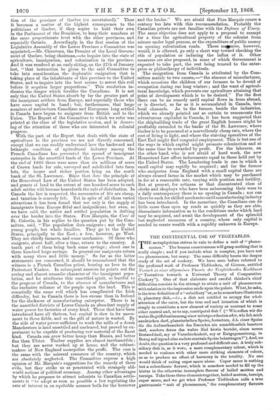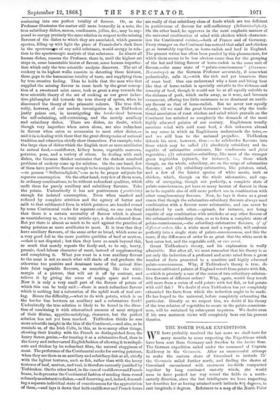THE CONTINENTAL USE OF VEGETABLES.
THE metaphysician strives in vain to define a unit of " pheno- menon." The human consciousness will grasp nothing that is really simple ; and if you include what is complex, you have not one phenomenon, but many. The same difficulty besets the deeper study of the art of cookery. We have once before referred to the profound work of Professor Tiefdenkeu, of Giessen, entitled Versuch zu einer allgemeinen Theorie der Veryleichenden Kochkunst (" Tentatives towards a Universal Theory of Comparative Cookery"). One of that elaborate and careful thinker's chief difficulties consists in the attempt to attain a unit of phenomenon with relation to the impression made upon the palate. What, he asks, is the true definition of a " subsidiary" or, as he somewhere illustrates it, planetary dish,—i.e., a dish not entitled to occupy the whole attention of the eater, but the true end and intention of which is simply to contribute a new element of variety or contrast to some other central and, so to say, centripetal dish ? (" Wie sollen wir die wahreBegriffsbestimmung einer untergeordneten oder, wie Ich mich ausdriicken darf, planetarischen Speise, festsetzen, d.h. einer Speise die die Aufmerksamkeit des Essenden nie ausschliesslich besetzen darf, sondern deren das wahre Ziel hierin besteht, einen neuen Bestandtheil, sey er Verschiedenheit, sey er Entgegensetzung, in Bezug auf irgend eine andere centrale Speise beizatragen ?") And, no doubt, the question is a very profound and difficult one. A truly sub- sidiary dish is, as it were, a mere complementary colour, which is needed to coalesce with other more striking elements of colour, so as to produce an effect of harmony in the totality. No one would think of eating caper sauce alone. Caper sauce is nothing but a subordinate flavour, which is somehow needed to fill up the hiatus in the otherwise incomplete flavour of boiled mutton and turnips. Take these three elements together, boiled mutton, turnips, caper sauce, and we get what Professor Tiefdenken calls a true gastronomic " unit of phenomenon," the complementary flavours coalescing into one perfect totality of flavour. Or, as the Professor illustrates the matter still more learnedly in a note, the true subsidiary dishes, sauces, condiments, jellies, &c., may be sup- posed to occupy precisely the same relation in respect to the missing flavours of the dishes to which they are associated, which gaseous spectra, filling up with light the place of Fraunhofer's dark lines in the spectroscope of any solid substance, would occupy in rela- tion to the spectroscopic analysis of that substance. In almost all human dishes, reasons the Professor, there is, until the highest art steps in, some lamentable hiatus of flavour, some human imperfec- tion which only the true scientific analysis discovers. The art of -cookery in its highest walks consists in detecting these hiatuses, these gaps in the harmonious totality of taste, and supplying them by true creative feeling. Thus he holds that the man who first supplied the missing flavour in roast lamb by the great concep- tion of a sweetened mint sauce, took as great a step towards the true scientific theory of the art of cooking as our great induc- tive philosopher did towards the true theory of optics, when he discovered the theory of the prismatic colours. The true diffi- culty, however, of our modern investigation is, as Tiefdenken justly points out, in investigating the border-land between the self-subsisting, self-containing, and the merely auxiliary and subsidiary dishes. There are dishes, no doubt, which though very imperfect when eaten alone, are also redundant in flavour when eaten as accessories to most other dishes,— and it in is dealing with these that the great divergencies of national tradition and education chiefly show themselves. For example, take the large class of dishes which the English treat as mere auxiliaries to animal food,—cauliflower, kidney beans, vegetable marrows, potatoes, peas, and a variety of others. In dealing with such dishes, the German thinker maintains that the darkest unsolved problems of cookery come up for solution. On the one hand, few of them have positive flavoar enough to be complete in themselves, —to possess " SelbsUndigkeit,"—so as to be proper subjects for separate consumption. On the other hand, very few of them seem, in ordinary combinations, to be without redundant qualities, which linfit them for purely auxiliary and subsidiary flavours. Take the potato. Undoubtedly it has not positiveness (positivitdt) enough for isolated consumption. Even when mashed and reduced by complete attrition and the agency of butter and milk to that sublimated form in which potatoes are handed round by some Continental cooks for separate eating, no one can deny that there is a certain neutrality of flavour which is almost as unsatisfactory as, to a truly artistic eye, a drab-coloured dress. But yet there is almost as much to be said against the practice of using potatoes as mere auxiliaries to meat. It is true that they have auxiliary flavours, of the same order as bread, which serve as a very good foil to the more positive qualities of beef or mutton, —that is not disputed ; but then they have so much beyond this, so much that merely repeats the foody and, so to say, heavy, prosaic, dead-labour character of meat, instead of supplementing and completing it. What you want in a true auxiliary flavour to the meat is not so much what will shade off and graduate the -otherwise too positive and dominant taste of the animal fibre into faint vegetable flavours, as something, like the white -margin of a picture, that will set it off by contrast, and _relieve it by giving the sense of ample space and room. Now it is only a very small part of the flavour of potato of which this can be truly said :----there is much redundant flavour -which is nothing but a reiteration of the uphill work of real eat- ing. Hence the difficulty,—what to do with potato, which is on the border line between an auxiliary and a substantive food ? Undoubtedly the true solution is likely to be found in the direc- tion of combining it with etherealized essences of meat stripped -of their fibrine, appetite-satisfying, character, but the perfect solution has not yet been reached. Tiefdenken thinks he sees more scientific insight in the bias of the Continent,—and also, as he reminds us, of the Irish Celts, in this, as in so many other things, -showing their kinship with the French as distinguished from the heavy Saxon genius,—for treating it as a substantive food, than in the heavy and rathercarnal English fashion of allowing it to redupli- cate and thicken by its redundant fibre, the natural stogginess of meat. The preference of the Continental cooks for serving potatoes, when they use them as an auxiliary and subsidiary dish at all, chiefly with the lighter textures, such as fish, rather than with the heavy textures of beef, mutton, and veal, is therefore earnestly justified by Tiefdenken. On the other hand, in the caseof cauliflowerand French beans, he deprecates the Continental fashion of sending them round .solemnly assubstantive dishes,—as if deserving, and, indeed, demand- ing a separate individual state of consciousness for the appreciation of them,—and lays it down that both cauliflower and French beans are really of that subsidiary olass of foods which are too deficient in positiveness of flavour for self-sufficiency (Selbststandigkeit). On the other hand, he approves in the most emphatic manner of the universal combination of salad with chicken which character- izes the Continental cuisine,—both of France and of Germany. Every stranger on the Continent has noticed that salad and chicken go as invariably together, as horse-radish and beef in England. The present writer has often been puzzled by this phenomenon, for which there seems to be less obvious cause than for the grouping of the hot and biting flavour of horse-radish in the same unit of flavour,—the same state of " palate-consciousness " (Gaunien- Bewusstseyn) as the German Professor accurately, if somewhat pedantically, calls it,—with the rich and yet tenacious fibre of roast beef. One can understand why a keen and biting heat like that of horse-radish is specially suitable to the richness and tenacity of beef, though it would not be at all equally suitable to the richness of pork, which melts away, as it were, and becomes evanescent, offering too little resistance to so dominant an auxili- ary flavour as that of horse-radish. But we never saw equally clearly, till we read the great German's treatise, why the tradi- tional association of roast chicken and salad which prevails on the Continent has satisfied so completely the demands of the most highly educated palates of our century. Englishmen usually associate a dad with cold roast beef, a dish unknown abroad in any sense in which an Englishman understands the term,— and we still lean to the national prejudice. Tiefdenken defends his view, however, thus: — he subdivides flavours into those which may be called (1) absolutely subsidiary and in- capable of substantive existence, like condiments and faint vegetables ; (2) substantive-subsidiary, like most of the stronger green vegetables (spinach, for instance), i.e., those which though, on the whole, subsidiary, are on the verge of substantive flavours ; and (3) subsidiary-substantive, like potatoes, salad, and a few of the fainter species of white meats, such as chicken, which, though on the whole substantive, and cap- able of occupying, though not perfectly, a complete state of palate-consciousness, yet have so many lacunae of flavour in them as to be capable also of still more perfect use in combination with other complementary flavours. Now, he lays it down as a great canon that though the substantive-subsidiary flavours always need combination with a flavour more substantive, and can never be reinforced by each other,—spinach, for instance, not being capable of any combination with artichoke or any other flavour of the substantive-subsidiary class, so as to form a complete state of palate-consciousness,—the subsidiary-substantive flavours, if of different orders, like a white meat and a vegetable, will coalesce perfectly into a single state of palate-consciousness, and this the more, if the difference of order be so great that the white meat is best eaten hot, and the vegetable cold, or vice versa.
Grant Tiefdenken's theory, and his explanation is really admirable. But after all, we must remember that his theory is as yet only the induction of a profound and acute mind from a great number of facts presented to a sensitive and highly educated palate-consciousness. Why, if Tiefdenken's theory is true, do the most cultivated palates of England revolt from potato with fish, —which is precisely a case of the union of two subsidiary-substan- tive flavours of different orders ? Why, again, would they revolt still more from a union of cold potato with hot fish, or hot potato with cold fish ? We doubt if even Tiefdenken has yet completely exhausted the facts from which the induction ought to be made. He has leaped to the universal, before completely exhausting the particular. Greatly as we respect him, we doubt if his theory of the true relation of vegetables to meats in the palate-conscious- ness, will be sustained by subsequent inquirers. We doubt even if his own maturest views will completely bear out his present theories.































 Previous page
Previous page